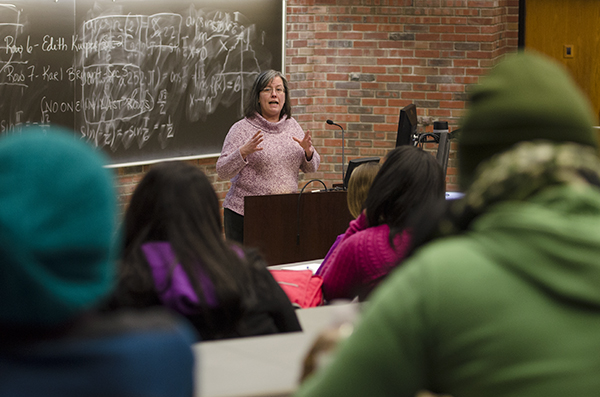
In 1973, the United States Supreme Court made their landmark Roe v. Wade decision, which legalized abortion in the United States. Forty years later, SUNY New Paltz will host a conference exploring the decision’s historical significance as well as the current struggles of women and their reproductive rights.
“Reproductive Justice: 40 Years after Roe v. Wade,” the 30th Women’s, Gender and Sexuality Studies Conference, will take place on Saturday, April 27 in the Lecture Center at 8 a.m. The conference is free for all students, who must pre-register, and $25 for the public.
The conference features a keynote panel, a historical panel, six panels on various topics, a photography exhibition and a call to action.
Event Coordinator and Lecturer Suzanne Kelly said choosing the conference theme was a “no brainer” for the planning committee.
“In thirty years, we’ve never done one on reproductive justice, and in recent years, we’ve seen so many new kinds of legislations — more kinds than in the past — challenging Roe v. Wade,” Kelly said.
Kathleen Dowley, coordinator of the Women’s, Gender and Sexuality Studies Program, also said the topic was the “natural choice,” especially in light of state legislators who are trying to further restrict women’s access to reproductive healthcare “in a variety of insidious ways.”
“The timing is just right to re-engage and reassess where we are today in terms of the reproductive justice movement, in the hope of reenergizing the next generation of feminist activists,” Dowley said.
According to the promotional conference brochure, the reproductive justice movement — which has been led by women of color organizations — recognizes a woman’s right to reproduce as her fundamental right as a human being.
“Reproductive justice means that a woman’s right to control her reproductive health should not be restricted because of race, religion, sexuality, disability, gender identity or expression, economic, immigrant or citizenship status or status as an incarcerated woman,” the brochure said.
Unlike previous years, Kelly said they did not put out a call for papers and decided to scale back on the number of panels offered.
“Last conference, we had a lot more panels that weren’t well attended. We wanted to have few panels — more condensed,” Kelly said. “We thought it would be nice for the first half of the conference to all move together from the keynote to the historical panel.”
Dowley said while the “plenary” panel will focus on the historical impact of Roe v. Wade in the United States, the scope of the afternoon panels is “very up to the moment,” including policy makers and activists from Planned Parenthood, The Center for Reproductive Rights and Family Planning Advocates of New York.
“[They] are engaged in the daily struggle to provide access and resources to women and their families,” she said.
Moderated by Professor Emerita Amy Kesselman, the keynote panel features SisterSong Founder Loretta Ross, Katherine Cross, core collective/board member of the Sylvia Rivera Law Project and Angela Hooton, state policy and advocacy director for The Center for Reproductive Rights.
The “Historical Perspectives on Reproductive Justice” panel features Kesselman, Assistant Professor Meg Devlin O’Sullivan and Rickie Solinger, a historian, author and curator. The three speakers will provide the historical context surrounding Roe v. Wade, including the limitations of the decision and the steps made by American women of color during the reproductive justice movement in the 1960s and ‘70s.
Kesselman will focus on the pre-Roe period, specifically an abortion case in Connecticut just before the Supreme Court decision. She said she will “inject” the stories of real women to show not only the effect activism had on the reproductive rights movement, but the campaign for women’s freedom as well.
“The decision for Roe v. Wade was not only made in the courtroom — it was made by women, who used the case as a way to travel and say how the anti-abortion bill was harming them and their lives,” Kesselman said. “It was because of women’s activism that women’s voices were heard by the justices who crafted Roe v. Wade.”
Other panel topics include protecting pregnant and parenting women, reproductive justice for youths, faith and religion, organizing and advocating for reproductive justice, global dimensions with a regional emphasis on Latin America and Africa, reproductive rights and the economics of reproductive decisions.
After the panel discussions, the event will move to the Library Exhibit Space for a reception and display of Beggars and Choosers: Motherhood is Not a Class Privilege in America with Solinger.
The conference will close with a call to action led by M. Tracey Brooks, president and CEO of Family Planning Advocates of New York. According to Kesselman, the call to activism is important in light of the recent call in Albany to pass a cluster of laws enhancing women’s rights in the state.
Kesselman said it’s important to hold a conference on reproductive justice because — rather than making strides in reproductive rights in the last couple of years — the movement has “lost a lot of ground.”
“It’s important to look at that and figure out how to revitalize and expand the movement,” she said. “Reproductive justice is the right to have control over one’s life, reproductive decisions, the right to bring a child up in a supportive environment, and if and when to have a child — it’s more than just abortion.”

